Potřebujeme váš souhlas k využití jednotlivých dat, aby se vám mimo jiné mohly ukazovat informace týkající se vašich zájmů. Souhlas udělíte kliknutím na tlačítko „OK“.
ASTM C191-13
Standard Test Methods for Time of Setting of Hydraulic Cement by Vicat Needle
Automaticky přeložený název:
Standardní zkušební metody pro Doba Nastavení hydraulického cementu Vicat Needle
NORMA vydána dne 1.12.2013
Informace o normě:
Označení normy: ASTM C191-13
Poznámka: NEPLATNÁ
Datum vydání normy: 1.12.2013
Kód zboží: NS-12475
Počet stran: 8
Přibližná hmotnost: 24 g (0.05 liber)
Země: Americká technická norma
Kategorie: Technické normy ASTM
Kategorie - podobné normy:
Anotace textu normy ASTM C191-13 :
Keywords:
automatic vicat, hydraulic-cement paste, time of setting, vicat, vicat needle, ICS Number Code 91.100.10 (Cement. Gypsum. Lime. Mortar)
Doplňující informace
| Significance and Use | ||||||||||||||||||||||||
|
5.1 This test method provides a means of determining compliance with a specification limit for Vicat time of setting. Refer to the appropriate specification for the cement to determine if this test method is used for specification compliance. 5.2 Time of setting measured by this method will not necessarily provide the same results as the time of setting of hydraulic cement paste measured by other methods, or the time of setting of mortar or concrete. |
||||||||||||||||||||||||
| 1. Scope | ||||||||||||||||||||||||
|
1.1 These test methods determine the time of setting of hydraulic cement by means of the Vicat needle. Two test methods are given; Method A is the Reference Test Method using the manually operated standard Vicat apparatus, while Method B permits the use of an automatic Vicat machine that has, in accordance with the qualification requirements of this method, demonstrated acceptable performance. 1.2 The values stated in SI units are to be regarded as standard. No other units of measurement are included in this standard. 1.3 This standard does not purport to address all of the safety concerns, if any, associated with its use. It is the responsibility of the user of this standard to establish appropriate safety and health practices and determine the applicability of regulatory limitations prior to use. Warning: Fresh hydraulic cementitious mixtures are caustic and may cause chemical burns to skin and tissue upon prolonged exposure.2 1.4 The text of this standard references notes and footnotes which provide explanatory material. These notes and footnotes (excluding those in tables and figures) shall not be considered as requirements of the standard.
|
|
Standard Specification for Reference Masses and Devices for Determining Mass and Volume for Use in Physical Testing of Hydraulic Cements
|
|
Standard Performance Specification for Hydraulic Cement
|
|
Standard Specification for Reagent Water
|
|
Standard Practice for Sampling and the Amount of Testing of Hydraulic Cement
|
|
Standard Test Method for Amount of Water Required for Normal Consistency of Hydraulic Cement Paste
|
|
Standard Test Method for Autoclave Expansion of Hydraulic Cement
|
|
Standard Test Method for Time of Setting of Hydraulic-Cement Paste by Gillmore Needles
|
|
Standard Practice for Mechanical Mixing of Hydraulic Cement Pastes and Mortars of Plastic Consistency
|
|
Standard Specification for Mixing Rooms, Moist Cabinets, Moist Rooms, and Water Storage Tanks Used in the Testing of Hydraulic Cements and Concretes
|
|
Standard Specification for Blended Hydraulic Cements
|
|
Standard Specification for Portland Cement
|
|
Standard Terminology Relating to Hydraulic and Other Inorganic Cements (Includes all amendments and changes 8/28/2020). |
Podobné normy:
Historická
1.8.2012
Historická
1.1.2013
Historická
1.8.2012
Historická
1.8.2012
Historická
1.4.2014
Historická
1.5.2014
Doporučujeme:
Aktualizace zákonů
Chcete mít jistotu o platnosti užívaných předpisů?
Nabízíme Vám řešení, abyste mohli používat stále platné (aktuální) legislativní předpisy.
Chcete vědět více informací? Podívejte se na tuto stránku.


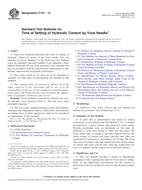
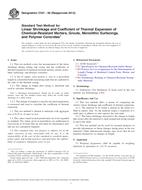 ASTM C531-00(2012)..
ASTM C531-00(2012)..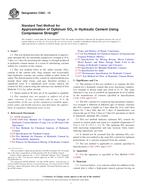 ASTM C563-13
ASTM C563-13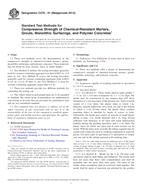 ASTM C579-01(2012)..
ASTM C579-01(2012)..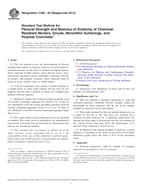 ASTM C580-02(2012)..
ASTM C580-02(2012)..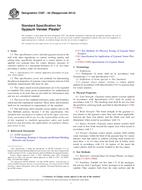 ASTM C587-04(2014)..
ASTM C587-04(2014)..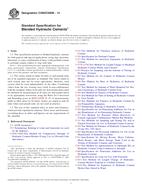 ASTM C595/C595M-14..
ASTM C595/C595M-14..
 Cookies
Cookies
